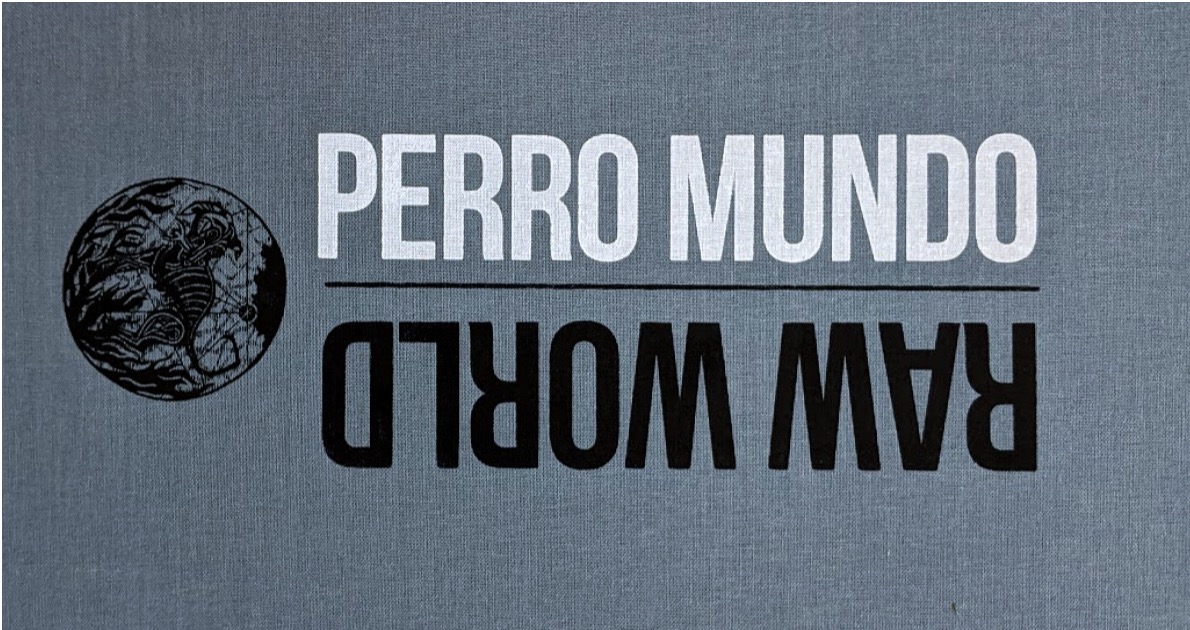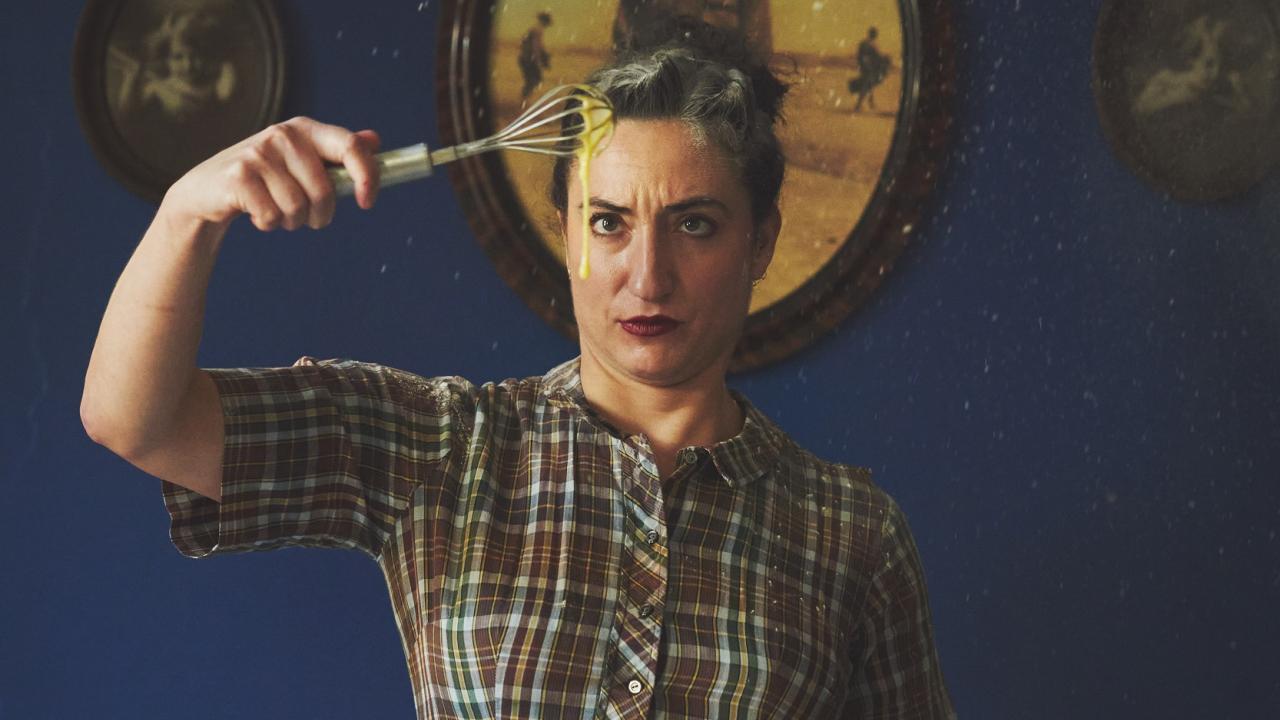This blog by Michelle Villagomez, Media Relations Intern, with much content help from Michael G. French, College of Letters and Science
‘FOOD,’ a theatre and dance production, begins today
A multisensory performance piece, FOOD offers up a dreamscape cooking show that promises to sate, disgust, amuse and amaze even the most discerning of appetites.
The UC Davis Department of Theatre and Dance production is co-devised and directed by Geoff Sobelle, Granada Artist-in-Residence. The free performance livestreams on March 4, 5 and 6 at 7 p.m. Register.
From the collective minds of UC Davis graduate and undergraduate student artists, and led by theatre artist Sobelle, the FOOD company invites the audience into their kitchens where they have prepared a singular feast of gargantuan proportion. Created specifically on Zoom for a remote audience, the performance is the result of a hive-mind meditation on the fuel that keeps the modern human-animal moving through the chaos we call “everyday life.”
“FOOD moves inside and outside of our bodies, our lives, our cultures and our ancient history to explore how the human-animal eats,” said Sobelle. “In a visceral, absurdist, highly physical style, the production traces the trajectory of the human sapiens from hunter/gatherer to farmer to consumer, using the theater and audience as wilderness, field and market.”
The FOOD creative team includes graduate students Danielle Levin, assistant director, and Barnaby O’Rorke, original composition. The performance is co-devised with cast members featuring graduate students Verónica Díaz-Muñíz, Ann Marie Dragich and Joseph Fletcher, and undergraduate students Mandy Romero, Julia Silvera, Ananya Yogi and Kaiden Zaldumbide. The production also includes undergraduate students Arden Siadek, stage manager, and Maria Solis-Morales, assistant stage manager.
The production contains adult language and themes including cannibalism, dismemberment and self-mutilation.
Learn more about the event here.
Art Studio Visiting Series Ramekon O’Arwisters today
Thursday, March 4, 4:30 p.m., free, via Zoom. Register.
Growing up in the Jim Crow South during the Civil Rights Movement, Ramekon O’Arwisters had a safe haven, where he was “embraced, important and special”— quilting with his grandmother. These early memories prompted his nascent series of unique crocheted/ceramic sculptures, Mending. Employing broken or discarded household or decorative pottery, O’Arwisters combines traditional crafts into a dimensional woven tapestry, stripping both cloth and ceramic of their intended function. He is the founder of Crochet Jam, a community arts project infused with folk-art traditions that foster a creative culture in cooperative relationships. He has been an artist-in-residence at the de Young Museum, the Djerassi Resident Artists Program and the Vermont Studio Center, and received grants and awards from Artadia: The Fund for Art and Dialogue, the San Francisco Foundation and the San Francisco Arts Commission Cultural Equity Program.
Organized by the Department of Art and Art History. Co-sponsored by the UC Davis College of Letters and Science and the Manetti Shrem Museum.
Learn more about the event in Manetti Shrem’s Winter 2021 Season Programs and Events.
TANA Virtually unveils online exhibition this Friday
Taller Arte del Nuevo Amanecer (TANA) will virtually unveil Consejo Gráfico Nacional's latest portfolio exchange titled Perro Mundo / Raw World. The online exhibition will be on view March 5 - April 25, 2021.

TANA is a collaborative partnership between the Chicana/o Studies Program at the University of California, Davis, and the greater Woodland community.
Portfolio Excerpt
Perro Mundo Is a portfolio focused on transborder themes covering the extreme conditions produced by neoliberalism and the social responses that resist said conditions. A social and environmental context is the foundation for images of transformation and social rebellion. These are not Ovidian Transformations actualized by the gods or the mysterious occult forces of nature. Instead metamorphosis implies an otherness occasioned by historical and material events, although, as in Ovid, they are constructed with mythical agents. Although visualized with mythical aspects of the characters are concrete symbols that identify specific social struggles.
Mission of Consejo Grafico Nacional
The Consejo Grafico Nacional is an independent coalition of printmaking workshops/talleres formed to advance the capacity and legacy of Latino printmakers (inclusive of all Americas) in the United States. Through a combination of collaborative projects, exhibitions, educational outreach and conferences, the Consejo promotes the continuity of critical and cultural activism in Contemporary Art.
Learn more here.
Shinkoskey Noon Concert presents ‘Brazilian Jazz’
Thursday, March 4, 12:05 p.m. to 1 p.m., free, via UC Davis Music’s Youtube Channel.
- Ricardo Peixoto, 7-string guitar
- Marcos Silva, piano
- Brian Rice, pandeiro and UC Davis lecturer in music
To learn more, go here.
Solo Oboe next week
Thursday, March 11, 12:05 p.m. to 1:00 p.m., free, via UC Davis Music’s Youtube Channel.
Kyle Bruckmann, solo oboe and UC Davis lecturer in music
- Alejandra Odgers: Semelíami (1996)
- Helen Grime: Arachne (2012)
- Hannah A. Barnes: Dis/inte/gration (2019, rev. 2020)
- Kyle Bruckmann: October 2020 (Fallen Leaf Lake) (2020)
- Premiere Performance: Kyle Bruckmann: Sift (new no normal) (2021), with Ellen Ruth Rose, viola
- Premiere Performance: Orlando Jacinto García: Separación (2001)
Legion of Honor Museum presents an ancient art council lecture, ‘On the road from Persepolis’
Saturday, March 6, 2 p.m. to 3:30 p.m., free, via Zoom. Register.
The UNESCO world heritage site of Persepolis in Iran became a globally famous, imperial ruin in the seventeenth century; foreign visitors took pieces of its architectural sculpture from the 18th century onwards, first as gifts, later as merchandise. This webinar by Legion of Honor Museum, follows the paths of these pieces as they expanded the physical boundaries of the Achaemenid capital, becoming contact relics for their homeland on distant shores. This webinar re-contextualizes the dispersed, stone emigres, including San Francisco’s, in their original fifth-century BC structures. It considers how their fragmentation transformed the resonance of the sculptures in isolation, but also affected the 20th-century conservation and study of their home.
Speaker: Dr. Lindsay Allen, lecturer in Greek & Near Eastern History, King’s College London
Learn more about the event here.
Coming up
Art History 102 students curate an exhibition
Tuesday, March 9, 4 p.m to 8 p.m., free, patio outside of Manetti Shrem Museum, Davis.
During the past year, the global health crisis has revealed how racial, gender and economic disparities are deeply embedded in the infrastructure of this country. Social unrest, in response to political upheaval and racial injustices, has rebuked these oppressive forces and ignited change to ensure survival for those at the margins. While survival defines existence as living in spite of difficulties, preservation is ensured through an active and continuous care of oneself.
The exhibition,“Reflecting Self-Care,” curated by Art History 102 students and Professor Susette Min, evaluates on one level the institutional mandate of higher education, and on another level, visualizes a curriculum where self-preservation and collective care are manifested through sustainable environments of learning and healing. In conversation with Andrea Bowers’s Education Should Be Free, the exhibition contemplates education that is free from a mentally and physically debilitating curriculum. By engaging in radical self-care, the curators of AHI 102 envision alternative modes of higher education that begin with caring for oneself. Reflecting Self-Care gathers artworks by artists–Sheridan Chavira, Fiona Heenan, Paola Lagunas, Simone Leigh, Xelestiál Moreno-Luz, Mimi McMillan, Benjamin Qin–and the UC Davis community to model a space of healing and revitalization for the mind and body by encouraging responsibility for communal wellness.
Co-curated by Dorian Aguilar, Larisa Peñaloza Almazán, Marah Carney, Andrea Cota, Lauryn Crum, Qinmi Guo, Rebecca Myers, Daisy Scott, Jane Seslar, Sarita Vindas, and Shaina Whaley, “Reflecting Self-Care” explores radical self-care and methods of self-preservation as an essential part of our collective politics and well-being.
Join the class on Tuesday, March 9, 4 to 5 p.m. at the Manetti Shrem Museum on the plaza/patio for a curator-led tour and at 7 p.m. online for a curator-led tour of the web component of the exhibition.
* Please note: The Manetti Shrem Museum remains closed at this time
The onsite component of the exhibition will run between March 9 and March 29; and the online component runs through Nov. 30, 2021.
For registration details (coming soon) and more information, go here.
Art + Feminism Wikipedia Edit-a-thon with SFMOMA
Tuesday, March 9, 4 p.m to 8 p.m., free, via Zoom. Register.
SFMOMA is hosting another edition of Art+Feminism’s ever-essential Wikipedia edit-a-thons, this time as a virtual gathering. Join them for an evening of collaborative Wikipedia updating focused on entries related to gender, art and feminism.
To help get this research party started, SFMOMA staff will provide a sampling of suggested topics and artists whose entries you might create, augment, or update — including various artists from the upcoming SFMOMA exhibition Nobody’s Darling. Then attendees will be joined by an experienced Wikipedia editor, who will begin the program with a platform tutorial. (Note: The editor will remain available throughout the four-hour session to answer questions. Drop-in attendance is welcome.)
People of all gender identities and expressions are invited to participate. Please create a Wikipedia account before the event; you can learn how to do that here. SFMOMA will be honoring Art+Feminism’s Safe Space/Brave Space policy. Please review the policy before attending.
Learn more about this event here.
At the Crocker: homeschool art connection introduces ‘Spirit Lines’
Tuesday, March 9, 12:30 p.m to 2:30 p.m., $0-$10, via Zoom. Register.
Discover new artists and works of art each month with Homeschool Art Connection. Scheduled for the second Tuesday of every month, the program features virtual tours and enriching, hands-on activities you can complete with easy-to-find supplies.
This month, examine the work of trailblazing Native American artist Helen Hardin (Santa Clara, 1943–1984), featured in Spirit Lines: Helen Harding Etchings. Then use bold, vibrant colors and lines to create your own original work. Please note, materials are not provided and parental involvement is encouraged. This event is free for members and $10 for nonmembers.
Learn more about the program here.
Crocker’s ‘Equity in Museums’ returns for the month of March
Thursday, March 11, 5 p.m., free, via Zoom. Register.
The realities of racial and social inequity within museums and cultural institutions have long been discussed in the field. As an institution, the Crocker has made a commitment to examine these issues internally and in the Museum’s relationship to the community. This discussion series seeks to open the conversation up to the wider public through attendee participation and features new panelists from the cultural sector each month. Tune in to this event for a dialogue that acknowledges exclusive practices in museums, and discusses solutions for furthering equal access, opportunity and engagement with the arts for all. The Arts Blog has covered past events, and UC Davis hosted a similar event last month. These are enlightening discussions for all.
Panelists include
